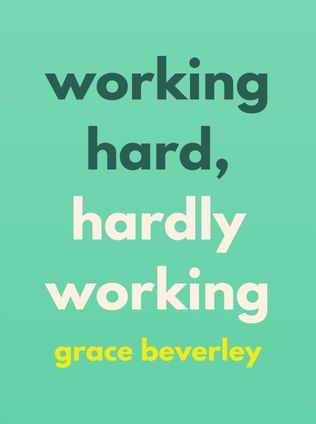
Working Hard, Hardly Working
How to achieve more, stress less and feel fulfilled
By Grace Beverley
Published 04/2021
About the Author
Grace Beverley, a British entrepreneur, emerged as a prominent figure in the digital landscape by leveraging social media platforms like Instagram and YouTube to share her insights on fitness and health. Her journey began as a fitness influencer, but her ambitions quickly transcended the world of online content creation. Beverley’s entrepreneurial spirit led her to found two successful companies: TALA, a sustainable fashion brand, and Shreddy, a platform dedicated to fitness plans and meal guides. These ventures are not merely commercial successes but reflect her commitment to sustainability and wellness—values that permeate her personal brand and public persona. Working Hard, Hardly Working is her debut book, and it serves as both a manifesto and a guide for those struggling to balance the demands of a high-achieving lifestyle with the need for self-care. Through this work, Beverley offers a candid exploration of her own experiences as a young entrepreneur, providing practical advice on how to thrive without sacrificing well-being.
Main Idea
In Working Hard, Hardly Working, Grace Beverley tackles the pervasive modern-day dilemma: how to be productive without burning out. She challenges the conventional wisdom that equates relentless productivity with success, arguing instead for a more sustainable approach that integrates self-care into the very fabric of our daily routines. Beverley’s central thesis is that productivity and self-care are not mutually exclusive; in fact, they are deeply intertwined. By redefining what it means to be productive, she offers a framework where achieving your goals and taking care of your mental and physical health go hand in hand. This book is a call to action for anyone caught in the exhausting cycle of overwork, urging them to reclaim their time and energy by prioritizing their well-being.
Table of Contents
- Introduction: The Myth of Productivity
- The Problem: Overwork and Burnout
- The Origins and Spread of Our Culture of Overwork
- The Solution: Stop Seeing Self-Care and Productivity as Opposites
- Strategies for Improving Your Self-Care and Productivity
- Conclusion: Redefining Success
Introduction: The Myth of Productivity
Grace Beverley opens Working Hard, Hardly Working by deconstructing the myth of productivity that dominates contemporary life. In today’s society, productivity is often held up as the ultimate virtue, with people equating their worth with how much they can accomplish in a day. Beverley challenges this notion by highlighting the negative consequences of this mindset, including stress, burnout, and a diminished quality of life. She argues that this obsession with productivity is not only harmful but also counterproductive, as it leads to diminishing returns on both work and personal well-being.
She writes,
“We’ve been conditioned to believe that our value lies in how much we can produce, but in reality, true productivity comes from balancing work with the necessary care of our bodies and minds.”Beverley’s argument is a powerful reminder that the relentless pursuit of productivity can lead to burnout, which ultimately undermines the very goals we are trying to achieve. By questioning the validity of this myth, she sets the stage for a new approach to work and life—one that prioritizes balance and well-being.
The Problem: Overwork and Burnout
Our Culture of Overwork
One of the central issues Beverley addresses in her book is the pervasive culture of overwork. In many ways, this culture is a byproduct of the myth of productivity, as people feel compelled to constantly work in order to prove their worth. Beverley argues that this mindset is particularly harmful to younger generations, such as Millennials and Gen Z, who are often caught in the cycle of overwork due to economic pressures and the influence of social media.
Beverley notes that this culture of overwork is deeply ingrained in our society, with many people viewing their downtime as unproductive or even wasteful. This mindset is reinforced by social media, where individuals often showcase their relentless work ethic as a badge of honor. However, this constant push to do more can lead to serious consequences, including burnout, mental health issues, and a general sense of dissatisfaction with life.
She reflects,
“Our obsession with side gigs and constant hustling is a reflection of a deeper societal issue—one where rest is undervalued, and work is glorified to the point of exhaustion.”Beverley’s insights highlight the dangers of overwork and the need to re-evaluate our relationship with productivity.
Continuous Access to Technology and Social Media
Another factor contributing to the problem of burnout, according to Beverley, is the continuous access to technology and social media. In today’s world, it’s almost impossible to fully disconnect from work, as our devices keep us tethered to our jobs at all times. This constant connectivity blurs the lines between work and personal life, making it difficult to truly unwind and recharge.
Beverley argues that social media, in particular, plays a significant role in perpetuating the culture of overwork. Platforms like Instagram and LinkedIn often glorify the hustle, with users showcasing their achievements and productivity in a way that can make others feel inadequate or compelled to work harder. This creates a vicious cycle where individuals are constantly comparing themselves to others, leading to increased stress and a diminished sense of self-worth.
Sign up for FREE and get access to 1,400+ books summaries.
You May Also Like
The Subtle Art of Not Giving a F*ck
A Counterintuitive Approach to Living a Good Life
By Mark MansonRich Dad Poor Dad
What the Rich Teach Their Kids About Money - That the Poor and Middle Class Do Not!
By Robert T. KiyosakiHow To Win Friends and Influence People
The All-Time Classic Manual Of People Skills
By Dale Carnegie



















